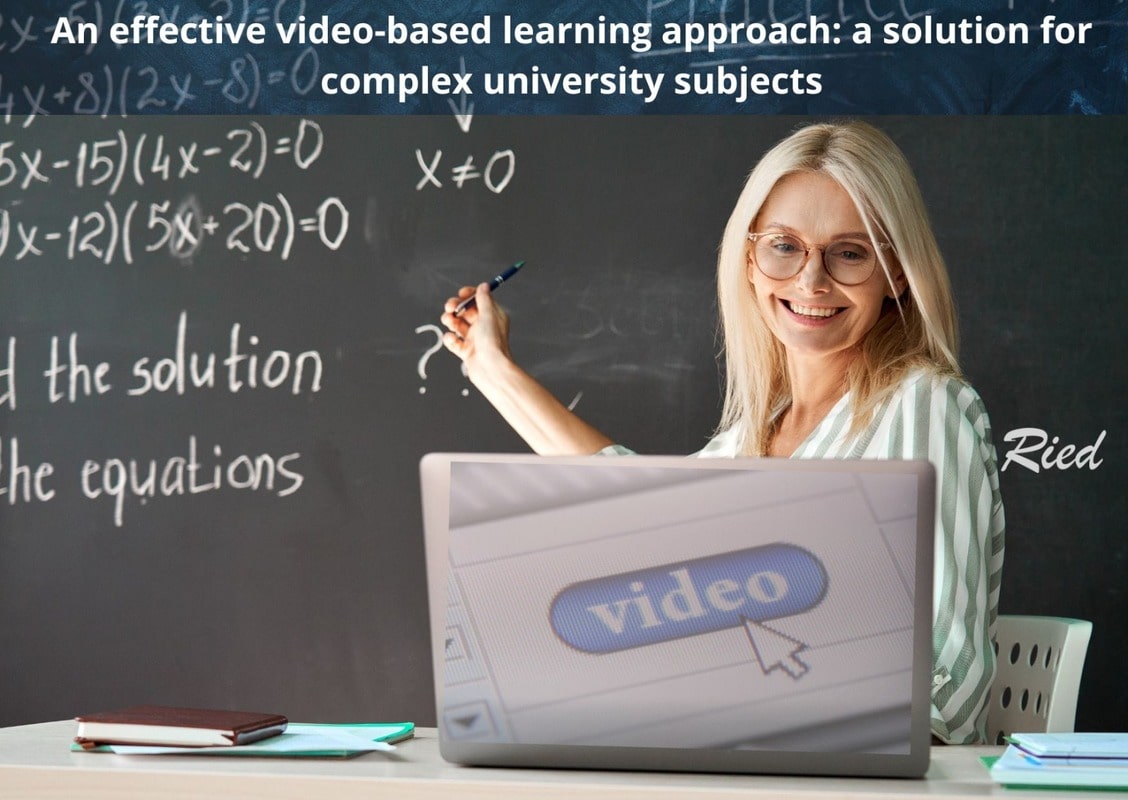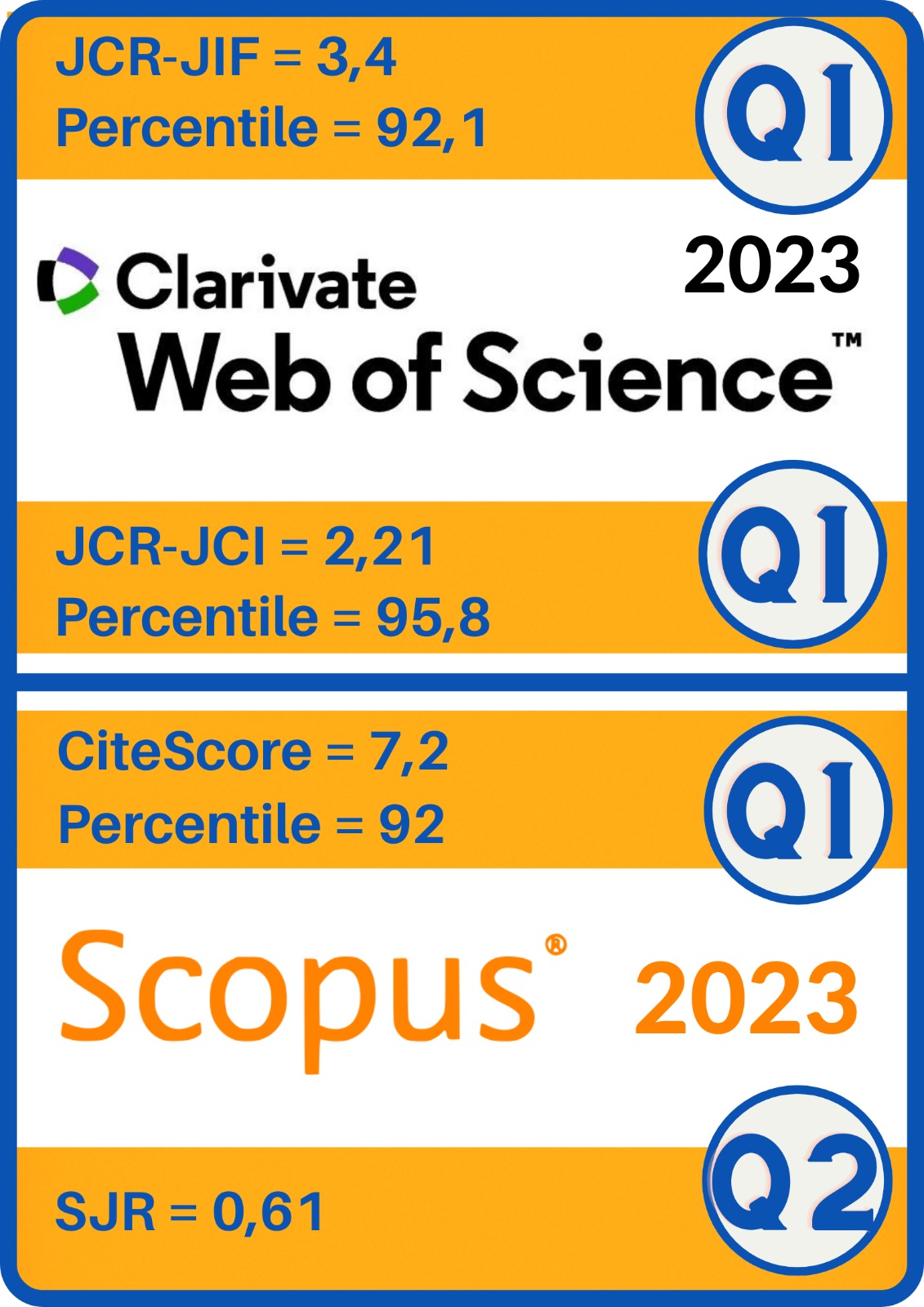Una propuesta efectiva de aprendizaje basado en videos: solución para asignaturas universitarias complejas
DOI:
https://doi.org/10.5944/ried.27.1.37569Palabras clave:
mapa de dificultad, aprendizaje visual, contabilidad, retroalimentación, enseñanza superiorResumen
Esta investigación presenta una herramienta que ofrece una ágil solución para aquellas asignaturas universitarias percibidas por los estudiantes con mayor complejidad. La herramienta combina, por un lado, el aprendizaje basado en videos y, por otro, un sistema de baremación de la dificultad, previo a la elaboración de los videos. Como punto de partida, se utiliza el feedback del estudiante para la obtención de un mapa de dificultad de la asignatura. A partir de las balizas identificativas de este mapa, se ha elaborado ad hoc un conjunto de videos para abordar las cuestiones clave y de mayor dificultad. Tras utilizar estos videos en la preparación de la materia, los estudiantes han realizado una encuesta de satisfacción, validada cualitativamente por expertos y cuantitativamente por el test Alpha de Cronbach. Los resultados de la encuesta reflejan la utilidad de la propuesta de aprendizaje diseñada y el interés despertado en los estudiantes. Asimismo, mediante un análisis estadístico, se pone de manifiesto una mejora en el rendimiento académico de aquellos que sí tuvieron acceso a estos videos, en comparación con el grupo de control. Utilizando como prueba piloto una asignatura de contabilidad, se ha conseguido llegar a una propuesta de aprendizaje que resulta extrapolable a cualquier ámbito de conocimiento. El sistema propuesto contribuye a un proceso de enseñanza eficaz para los estudiantes y les otorga el rol de protagonistas en su propia formación académica.
ARTÍCULO COMPLETO:
https://revistas.uned.es/index.php/ried/article/view/37569/28008
Descargas
Citas
Barrera, H. M., Barragán, T. M., & Ortega, G. E. (2017). La realidad educativa ecuatoriana desde una perspectiva docente. Revista Iberoamericana de Educación, 75(2), 9-20. https://doi.org/10.35362/rie7522629
Bland, J. M., & Altman, D. G. (1997). Statistics notes: Cronbach's alpha. BMJ, 314, 572. https://doi.org/10.1136/bmj.314.7080.572
Brame, C. J. (2016). Effective educational videos: Principles and guidelines for maximizing student learning from video content. CBE—Life Sciences Education, 15(es6), 1-6. https://doi.org/10.1187/cbe.16-03-0125
Bravo, G., & Cáceres, M. (2006). El proceso de enseñanza-aprendizaje desde una perspectiva comunicativa. Revista Iberoamericana de Educación, 38(7), 1-7. https://doi.org/10.35362/rie3872607
Camacho Miñano, M. D. M., Urquía Grande, E., Pascual Ezama, D., & Rivero Menéndez, M. J. (2016). Recursos multimedia para el aprendizaje de Contabilidad Financiera en los grados bilingües. Educación XX1, 19(1), 63-89. https://doi.org/10.5944/educxx1.15578
Campoverde-Luque, R. I., Zambrano-Torres, R. D. R., Arellano-Pintado, M. S., & Cantos-Arellano, T. M. (2022). Implementación de la Propuesta BCC: Aplicación de la práctica contable desde la virtualidad en el proceso de enseñanza-aprendizaje en la asignatura de contabilidad. 593 Digital Publisher CEIT, 7(4-2), 157-174. https://doi.org/10.33386/593dp.2022.4-2.1212
Caurcel Cara, M. J., & Crisol Moya, E. (2022). Ciberacoso en estudiantes universitarios antes y durante el confinamiento por la COVID-19. Educación XX1, 25(1), 67-91. https://doi.org/10.5944/educxx1.30525
Chugh, R., Macht, S., & Harreveld, B. (2022). Supervisory feedback to postgraduate research students: a literature review. Assessment & Evaluation in Higher Education, 47(5), 683-697. https://doi.org/10.1080/02602938.2021.1955241
Cleland, J., McKimm, J., Fuller, R., Taylor, D., Janczukowicz, J., & Gibbs, T. (2020). Adapting to the impact of COVID-19: Sharing stories, sharing practice. Medical Teacher, 42(7), 772-775. https://doi.org/10.1080/0142159X.2020.1757635
Dong, C., & Goh, P. S. (2015). Twelve tips for the effective use of videos in medical education. Medical Teacher, 37(2), 140-145. https://doi.org/10.3109/0142159X.2014.943709
Evans, C. (2013). Making Sense of Assessment Feedback in Higher Education. Review of Educational Research, 83(1), 70-12. https://doi.org/10.3102/0034654312474350
Fogarty, T. J. (2020). Accounting education in the post-COVID world: looking into the Mirror of Erised. Accounting Education, 29(6), 563-571. https://doi.org/10.1080/09639284.2020.1852945
Giannakos, M. N., Sampson, D. G., & Kidziński, Ł. (2016) Introduction to smart learning analytics: foundations and developments in video-based learning. Smart Learning Environments, 3(1), 1-9. https://doi.org/10.1186/s40561-016-0034-2
Gil-Galván, R., & Gil-Galván, F. J (2021). Percepciones de los estudiantes universitarios sobre las competencias adquiridas mediante el aprendizaje basado en problemas. Educación XX1, 24(1), 271-295. https://doi.org/10.5944/educxx1.26800
Hair, J. F., Risher, J. J., Sarstedt, M., & Ringle, C. M. (2019). When to use and how to report the results of PLS-SEM. European Business Review, 31(1), 2-24. https://doi.org/10.1108/EBR-11-2018-0203
Han, F., & Ellis, R. A. (2019). Using phenomenography to tackle key challenges in science education. Frontiers in Psychology, 10, 1414. https://doi.org/10.3389/fpsyg.2019.01414
Kay, R. H. (2012). Exploring the use of video podcasts in education: A comprehensive review of the literature. Computers in Human Behavior, 28(3), 820-831. https://doi.org/10.1016/j.chb.2012.01.011
Kim, D., Jo, I. H., Song, D., Zheng, H., Li, J., Zhu, J., Huang, X., Yan, W., & Xu, Z. (2021). Self-regulated learning strategies and student video engagement trajectory in a video-based asynchronous online course: a Bayesian latent growth modeling approach. Asia Pacific Education Review, 22(2), 305-317. https://doi.org/10.1007/s12564-021-09690-0
Ljubojevic, M., Vaskovic, V., Stankovic, S., & Vaskovic, J. (2014). Using Supplementary Video in Multimedia Instruction as a Teaching Tool to Increase Efficiency of Learning and Quality of Experience. International Review of Research in Open and Distributed Learning, 15(3), 275-291. https://doi.org/10.19173/irrodl.v15i3.1825
Madariaga, L., Nussbaum, M., Gutiérrez, I., Barahona, C., & Meneses, A. (2021). Assessment of user experience in video-based learning environments: From design guidelines to final product. Computers & Education, 167, 104176. https://doi.org/10.1016/j.compedu.2021.104176
Martín-Cuadrado, A. M., Lavandera-Ponce, S., Mora-Jaureguialde, B., Sánchez-Romero, C., & Pérez-Sánchez, L. (2021). Working methodology with public universities in Peru during the pandemic—continuity of virtual/online teaching and learning. Education Sciences, 11(7), 351. https://doi.org/10.3390/educsci11070351
Medina López, A., Delgado Jalón, M. L., & Cámara Sánchez, A. (2021). Consequences of covid-19 in higher education. Online or presential teaching? Journal of Management and Business Education, 4(3), 275-288. https://doi.org/10.35564/jmbe.2021.0016
Nicol, D., Thomson, A., & Breslin, C. (2014). Rethinking feedback practices in higher education: a peer review perspective. Assessment & Evaluation in Higher Education, 39(1), 102-122. https://doi.org/10.1080/02602938.2013.795518
Renkl, A., & Scheiter, K. (2017). Studying visual displays: How to instructionally support learning. Educational Psychology Review, 29(3), 599-621. https://doi.org/10.1007/s10648-015-9340-4
Reyes-Menéndez, A., Saura, J. R., & Martínez-Navalón, J. G. (2019). The impact of e-WOM on hotels management reputation: exploring tripadvisor review credibility with the ELM model. IEEE Access, 7, 68868-68877. https://doi.org/10.1109/ACCESS.2019.2919030
Rodríguez, M., Huerta, P., Valencia, C., Montano, E., & Ortega, Y. (2023). Innovación educativa con redes sociales aplicada a la asignatura de Salud Pública. Educación Médica, 24(3), 100798. https://doi.org/10.1016/j.edumed.2023.100798
Sablić, M., Mirosavljević, A., & Škugor, A. (2021). Video-based learning (VBL)—past, present and future: An overview of the research published from 2008 to 2019. Technology, Knowledge and Learning, 26(4), 1061-1077. https://doi.org/10.1007/s10758-020-09455-5
Sangster, A., Stoner, G., & Flood, B. (2020). Insights into accounting education in a COVID-19 world. Accounting Education, 29(5), 431-562. https://doi.org/10.1080/09639284.2020.1808487
Schworm, S., & Renkl, A. (2007). Learning argumentation skills through the use of prompts for self-explaining examples. Journal of Educational Psychology, 99(2), 285. https://doi.org/10.1037/0022-0663.99.2.285
Scott, S. V. (2014). Practising what we preach: towards a student-centred definition of feedback. Teaching in Higher Education, 19(1), 49-57. https://doi.org/10.1080/13562517.2013.827639
Segovia-García, N., Said-Hung, E., & García Aguilera, F. (2022). Educación Superior virtual en Colombia: factores asociados al abandono. Educación XX1, 25(1), 197-218. https://doi.org/10.5944/educxx1.30455
Vedder-Weiss, D., Segal, A., & Lefstein, A. (2019). Teacher face-work in discussions of video-recorded classroom practice: Constraining or catalyzing opportunities to learn? Journal of Teacher Education, 70(5), 538-551. https://doi.org/10.1177/0022487119841895
Villaseñor Rodríguez, I. (2014). Las preguntas frecuentes como herramienta metodológica para el estudio del fenómeno de las necesidades de información: el caso de las bibliotecas universitarias madrileñas. In J. Ríos Ortega & C. A. Ramírez Vázquez, (Coord.), Naturaleza y método de la investigación bibliométrica y de la información (173-179). Universidad Nacional Autónoma de México. https://ru.iibi.unam.mx/jspui/handle/IIBI_UNAM/CL380
Winstone, N., Boud, D., Dawson, P., & Heron, M. (2022). From feedback-as-information to feedback-as-process: a linguistic analysis of the feedback literature. Assessment & Evaluation in Higher Education, 47(2), 213-230. https://doi.org/10.1080/02602938.2021.1902467
Yousef, A. M. F., Chatti, M. A., & Schroeder, U. (2014a). The state of video-based learning: A review and future perspectives. International Journal on Advances in Life Sciences, 6(3), 122-135.
Yousef, A. M. F., Chatti, M. A., & Schroeder, U. (2014b). Video-based learning: A critical analysis of the research published in 2003-2013 and future visions. In eLmL 2014, The Sixth International Conference on Mobile, Hybrid, and On-line Learning, 112-119.
Zhao, F. (2019). Using Quizizz to integrate fun multiplayer activity in the accounting classroom. International Journal of Higher Education, 8(1), 37-43. https://doi.org/10.5430/ijhe.v8n1p37

Publicado
Cómo citar
Número
Sección
Licencia
Derechos de autor 2023 Alba Gómez-Ortega, Almudena Macías-Guillén, Miguel Ángel Sánchez-de Lara, Maria Luisa Delgado-Jalón

Esta obra está bajo una licencia internacional Creative Commons Atribución 4.0.
Las obras que se publican en esta revista están sujetos a los siguientes términos:
1. Los autores ceden de forma no exclusiva los derechos de explotación de los trabajos aceptados para su publicación en "RIED. Revista Iberoamericana de Educación a Distancia," y garantizan a la revista el derecho a ser la primera en publicar ese trabajo, igualmente, permiten a la revista distribuir obras publicadas bajo la licencia indicada en el punto 2.
2. Las obras se publican en la edición electrónica de la revista bajo una licencia Creative Commons Reconocimiento 4.0 Internacional (CC BY 4.0). Se permite copiar y redistribuir el material en cualquier medio o formato, adaptar, remezclar, transformar y crear a partir del material para cualquier finalidad, incluso comercial. Debe reconocer adecuadamente la autoría, proporcionar un enlace a la licencia e indicar si se han realizado cambios.
3. Condiciones de auto-archivo. Se permite e incentiva a los autores a difundir electrónicamente la versión OnlineFirst (versión evaluada y aceptada para su publicación) de su obra antes de su publicación definitiva, siempre con referencia a su publicación en RIED, ya que favorece su circulación y difusión antes y así propiciar un posible aumento de su citación y alcance entre la comunidad académica. Color RoMEO: verde.







